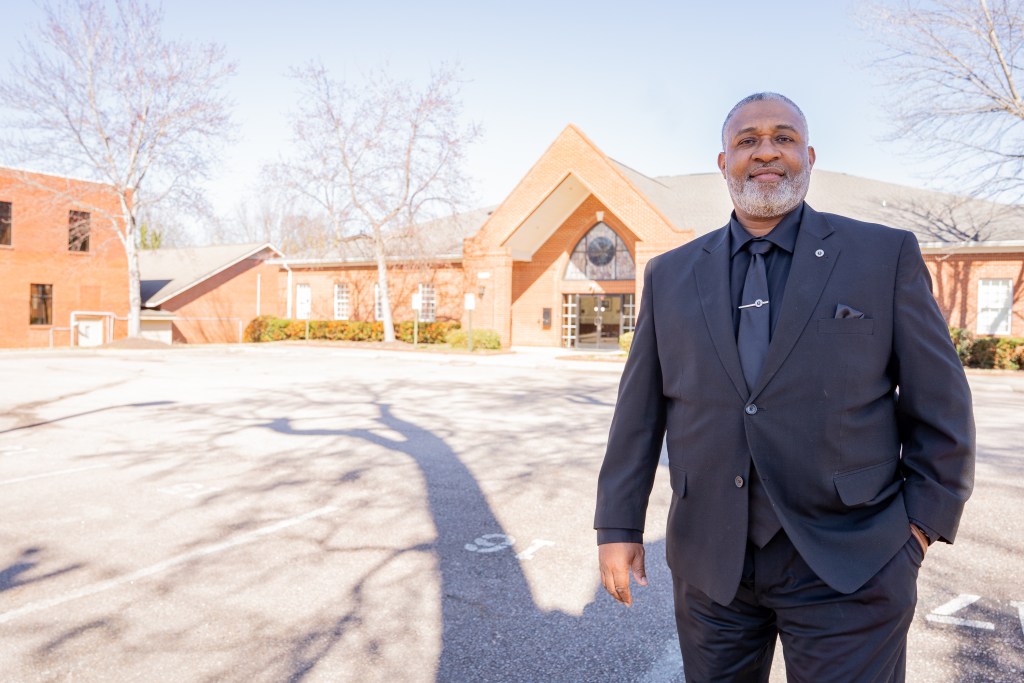On a Thursday evening in November, nine denizens of Southeast Raleigh file into the multipurpose room at Martin Street Baptist Church and take seats around plastic folding tables arranged in a U shape. The tables are cluttered with sheafs of notes, stacks of neon Post-its, and paper plates piled high with fragrant Greek food.
Nadia Moreta, a member of the City of Raleigh’s community engagement department, challenges the group to a thought experiment: imagine it’s 10 years from now. The six-acre lot down the street—which currently houses an empty former DMV building—has been transformed into something new. The project is a huge success. What’s the headline in the local paper?
After a few minutes of careful thought, the group members take turns sharing their ideas:
“Former DMV site exemplifies diversity, modernization, and vitality.”
“BRT [Bus Rapid Transit] ridership doubles as affordable housing units open on former DMV site.”
“Raleigh’s former DMV site is providing solutions to societal problems.”
The group members smile and murmur appreciatively after hearing each headline, relaxing into the rhythm of the meeting. They’ve been gathering once a month since May to discuss what to build in place of the former state DMV headquarters on New Bern Avenue, which has sat empty for years. The 12 group members (three are absent tonight) represent a cross-section of the city by age, race, gender, and family ties to Raleigh.
When the city purchased the former DMV site for $20 million last summer, local leaders and residents greeted the move with a mixture of excitement and trepidation. The acquisition presented an opportunity to meaningfully influence the development of the New Bern Avenue corridor, which cuts through the historically Black, rapidly gentrifying neighborhoods of Southeast Raleigh. All around the former DMV site, private developers were erecting expensive townhomes and multi-story apartment complexes, driving up property taxes and the cost of living for longtime residents. Maybe this site could be converted into something different, they thought—affordable housing, a grocery store, or a community hub. Others questioned whether they could trust the city to prioritize legacy residents and the history and culture of Southeast Raleigh over its bottom line.
Enter the project working group, made up mainly of longtime residents tasked with making a recommendation to the city about what to build on the former DMV site. They’ve spent months doing community outreach, gathering responses to an online survey, and debating possible uses for the site. With help from city staff, they’ve examined case studies of mixed-use developments situated near public transit in other cities. (The former DMV site is located near the planned New Bern Avenue Bus Rapid Transit corridor, though BRT construction has been delayed by several years due to a lack of construction bids.)
Once the working group makes its recommendation this spring, city staff will put out a request for proposals (RFP), inviting developers and other organizations to bid for the construction contract according to their specifications. Before anything can be built, the existing structure needs to be demolished. All told, the RFP, demolition, design, and construction phases will likely take several years.
The working group members and more than 400 survey respondents agree that creating affordable housing on the former DMV site is priority number one.
“In Raleigh, anywhere inside the Beltline, there’s nothing really affordable anymore,” says Anthony Pope, a working group member who lives blocks away from the former DMV in a home his mother purchased decades ago, which he now co-owns with his sister. As we talk on the phone, Pope narrates the view from his front window.
“I’m looking at 25 rental units, single-family homes,” he says. “They’re so close together, you can literally reach out the window and touch the person that lives next to you. They’re renting for $3,700 a month. … On the other side of those, there are 12 three-story townhouses that are selling for $1.3 million.”
Aside from housing, other popular ideas for the former DMV site include a grocery store or a shopping and entertainment space. There’s consensus among the working group members that the site ought to give the surrounding neighborhood an economic and social boost, without raising the cost of living or accelerating displacement. Over their two remaining meetings, the members will need to distill their big ideas down to a set of specific criteria for the RFP.
“We need to start having hard conversations that may be a little bit uncomfortable at times,” Tiesha Mosley, the city’s director of community engagement, counseled the working group at a recent meeting.
Dr. Shawn Singleton, the pastor at Martin Street Baptist, has been skeptical of this redevelopment project from the beginning. In 2023, before its sale to the city was even finalized, he told INDY he had “no optimism at all” that the city would deliver something beneficial to longtime residents.
Still, Singleton joined the project working group to have a voice in the decision-making process, both for himself individually and for his church. Today, he’s only slightly softened his stance.
“I’ve tried to temper my expectations,” Singleton says, explaining that he’s heard a lot of great ideas that can’t all be achieved simultaneously. “Money is going to drive this train. This is going to be a huge economic investment by some contractor, and they’re in the business of making money.”

City of Raleigh staff told INDY they are committed to balancing community needs with practical development constraints for the former DMV property. They’re exploring a new financial model that could make it easier to put affordable housing on the site. They declined to provide a concrete timeline or budget for the project, since many key details remain undecided.
The project working group’s meetings on March 13 and April 10 are open to the public. Find more information about the group and the former DMV site here.
Chloe Courtney Bohl is a corps member for Report for America. Reach her at [email protected]. Comment on this story at [email protected].
